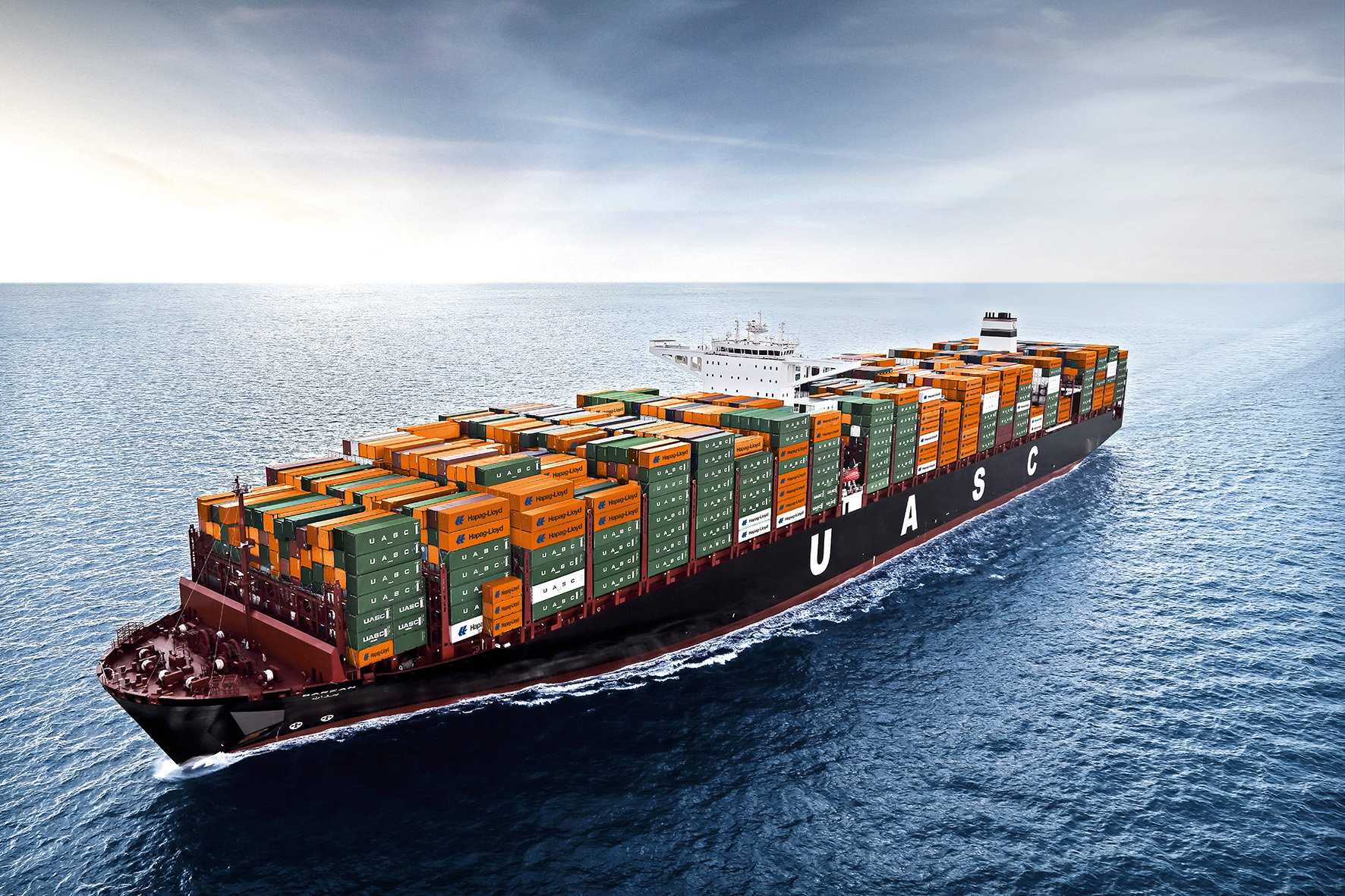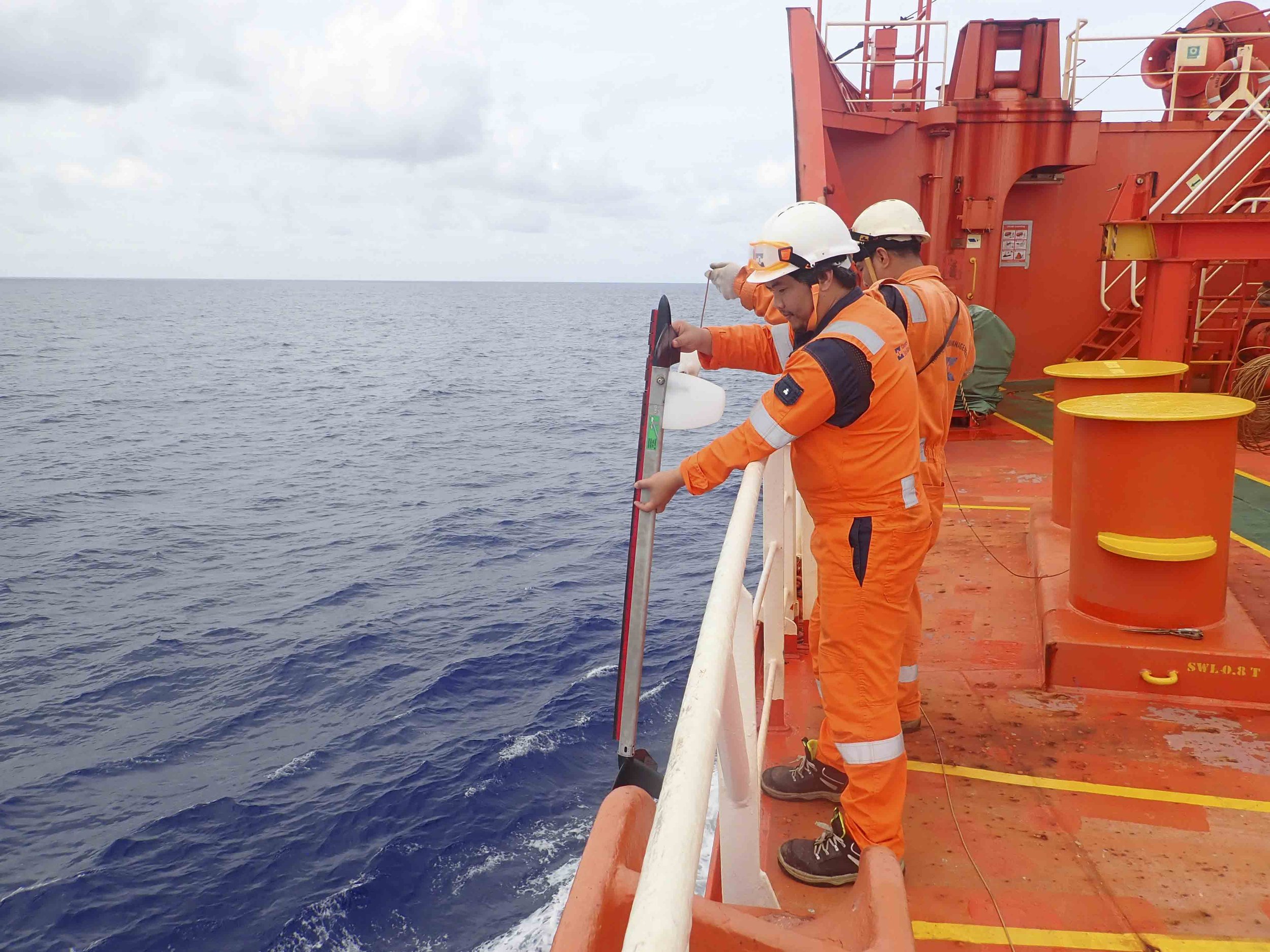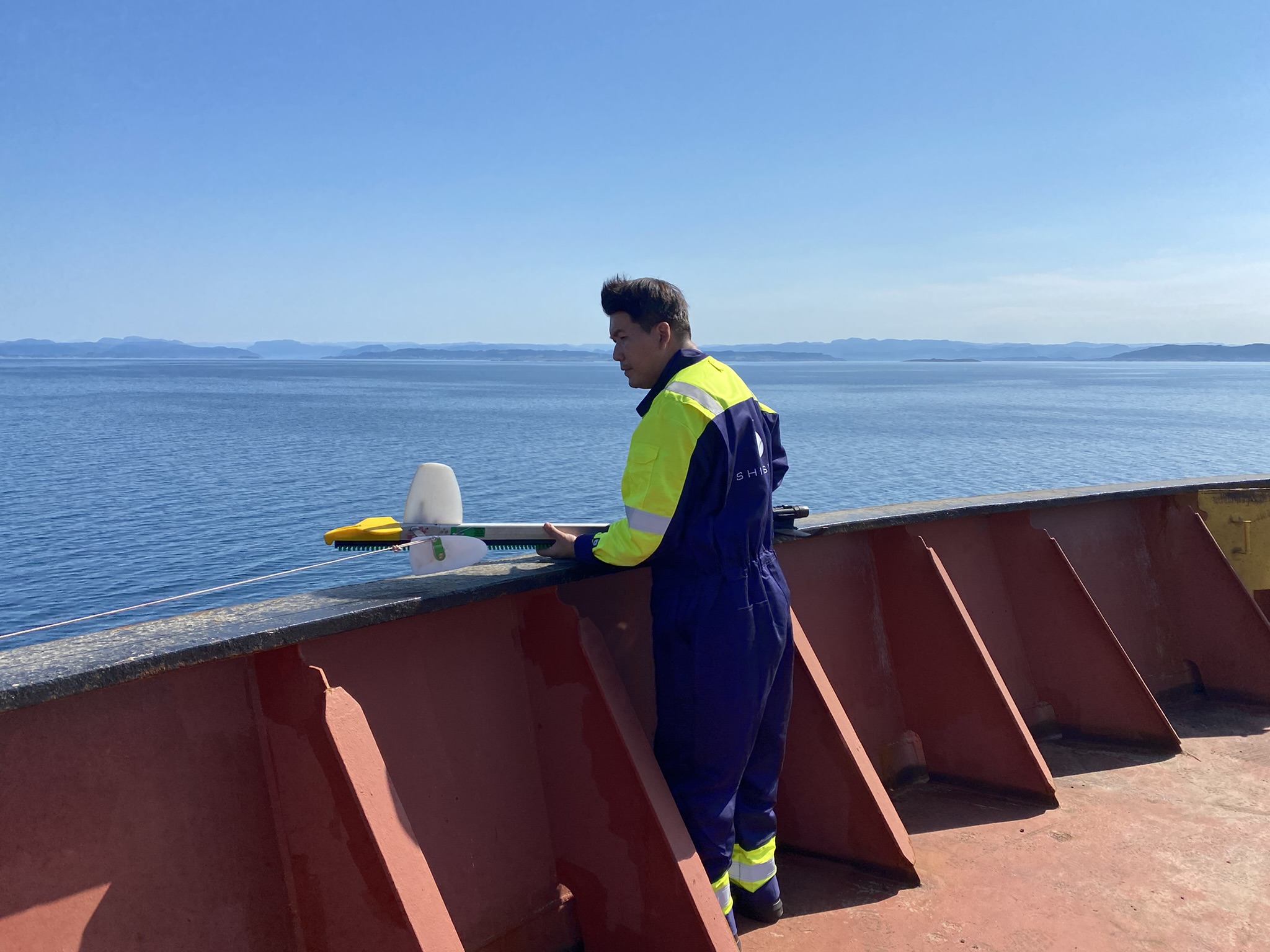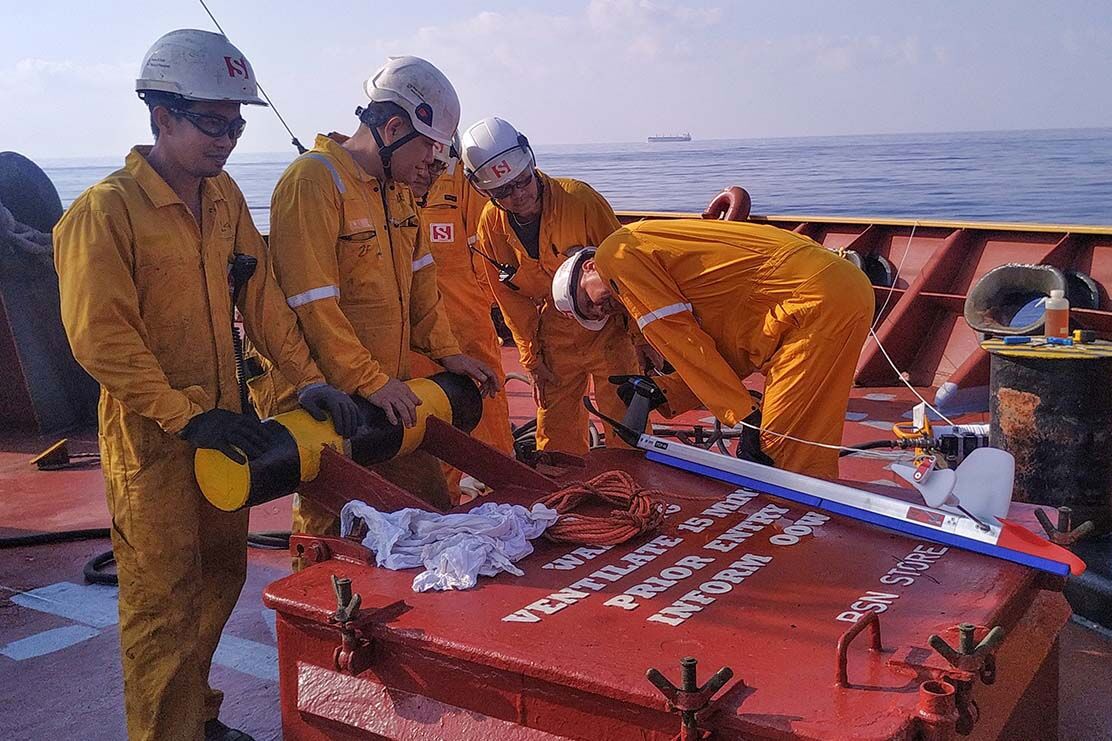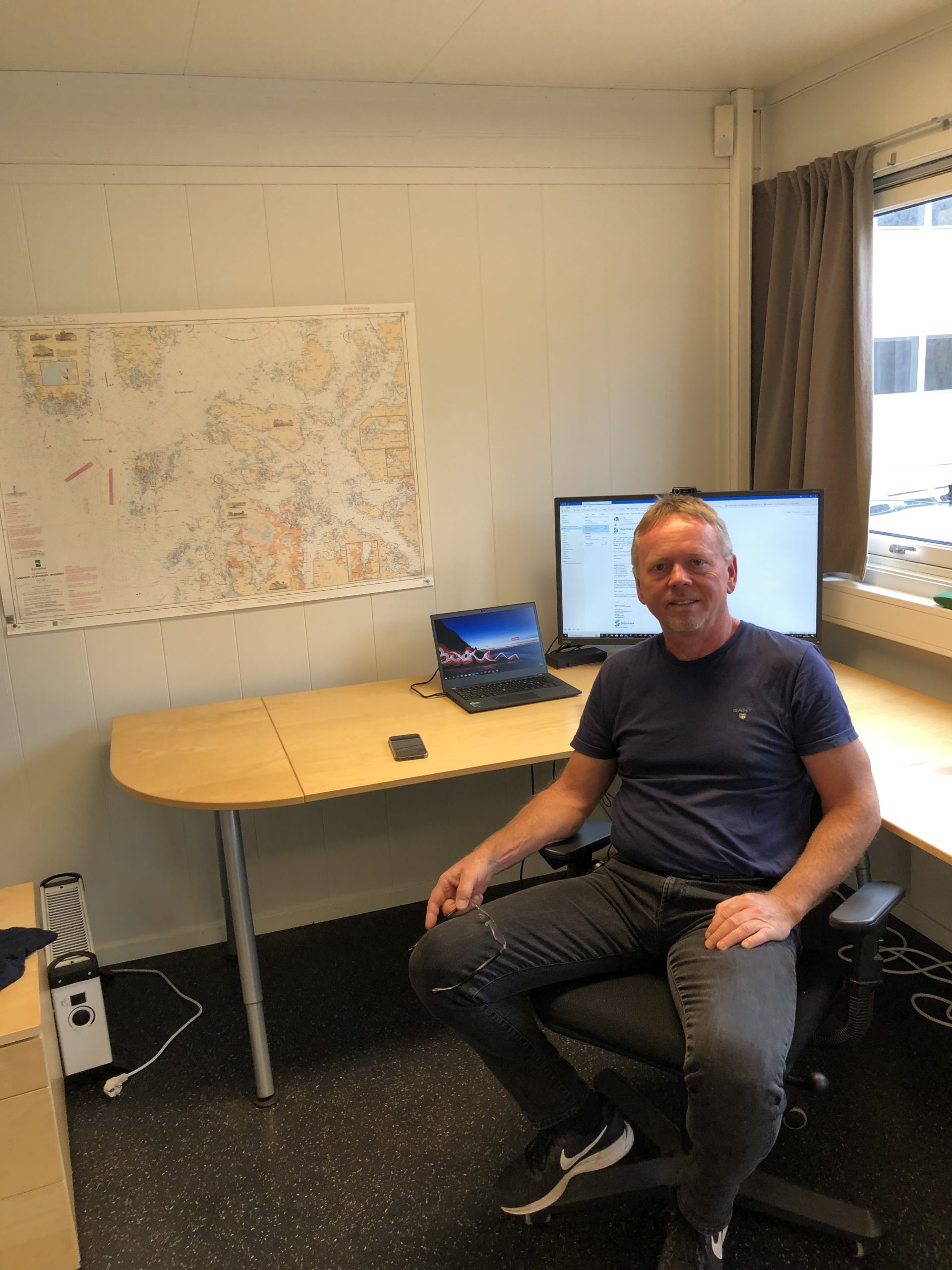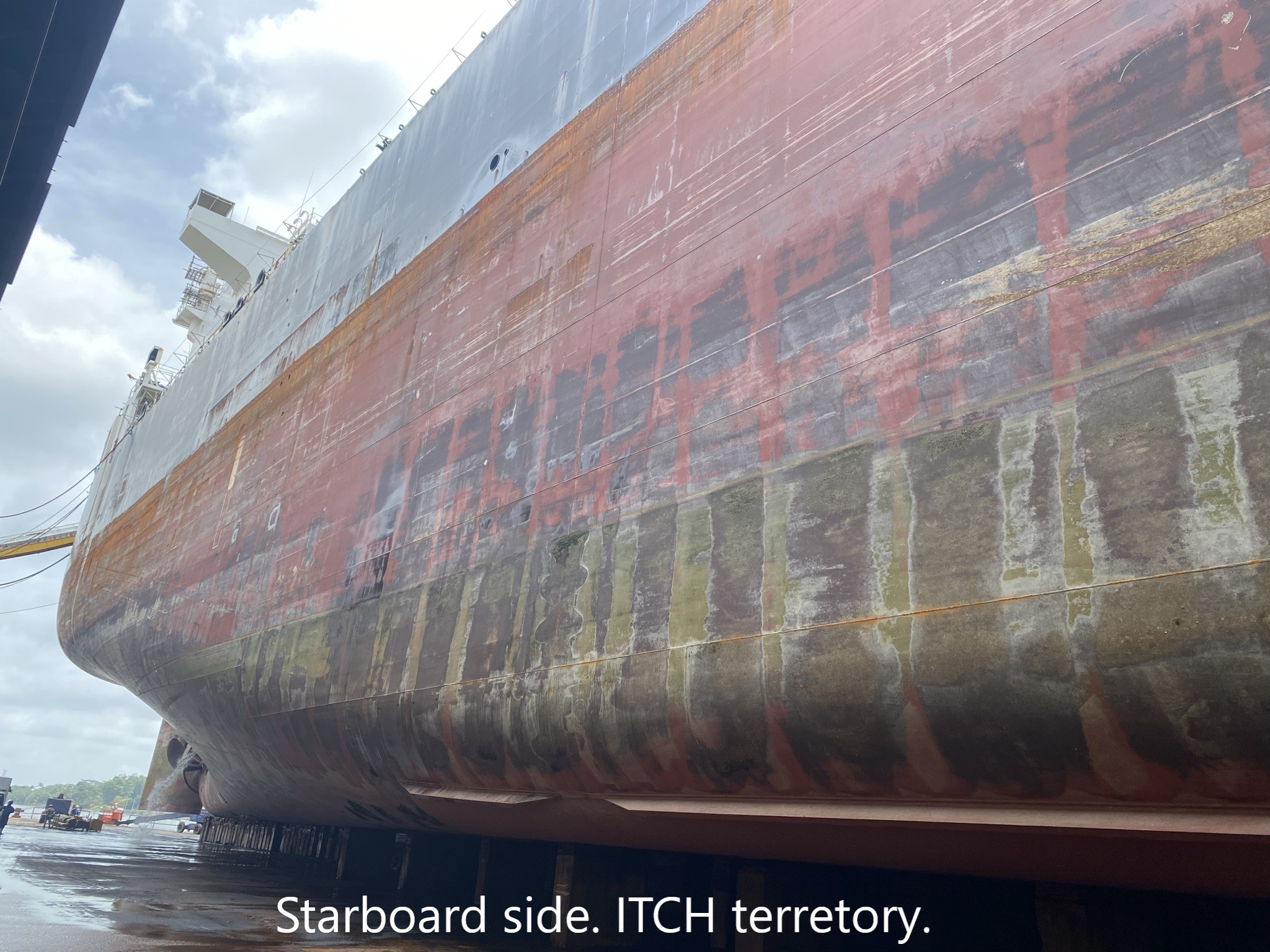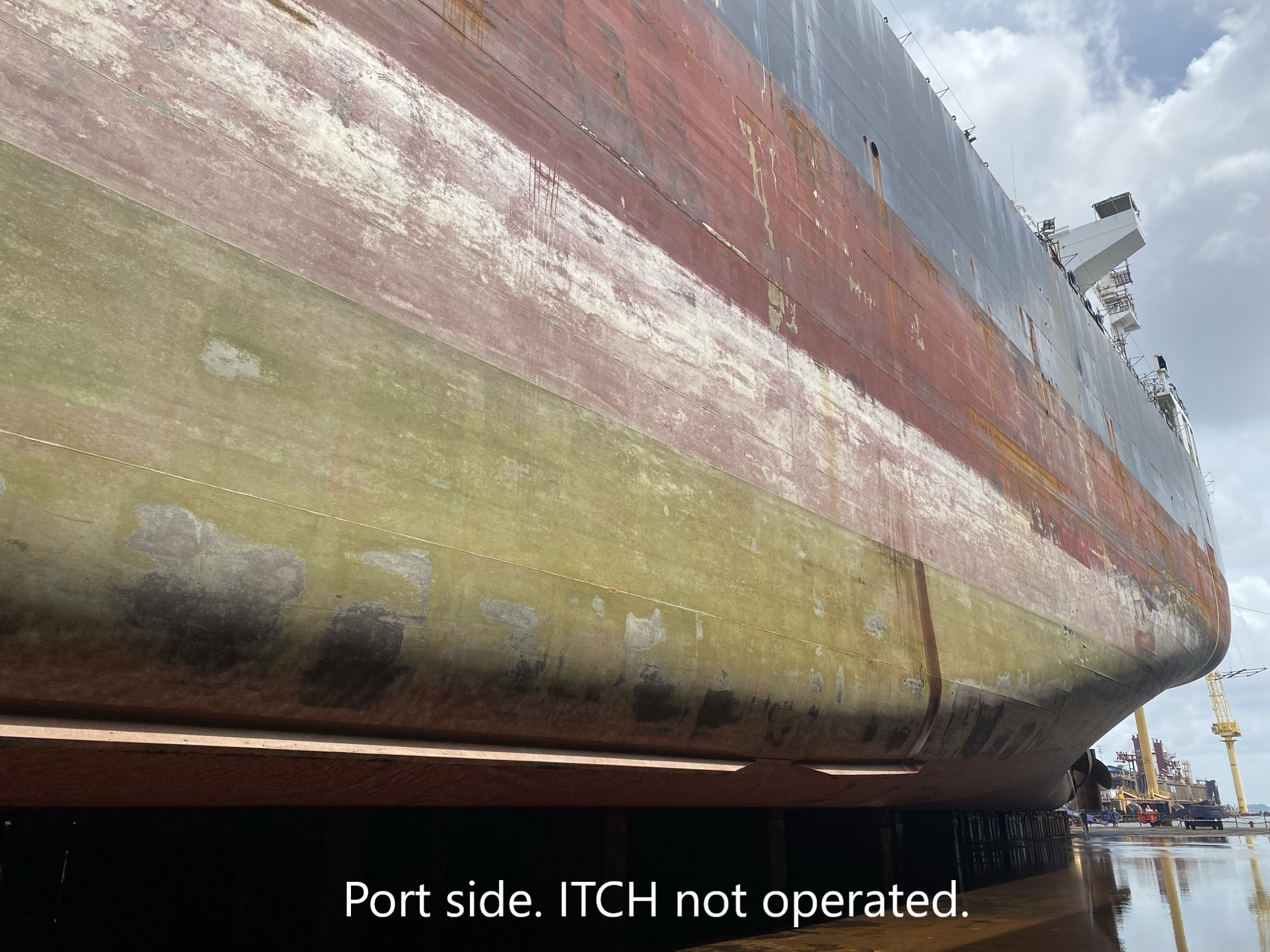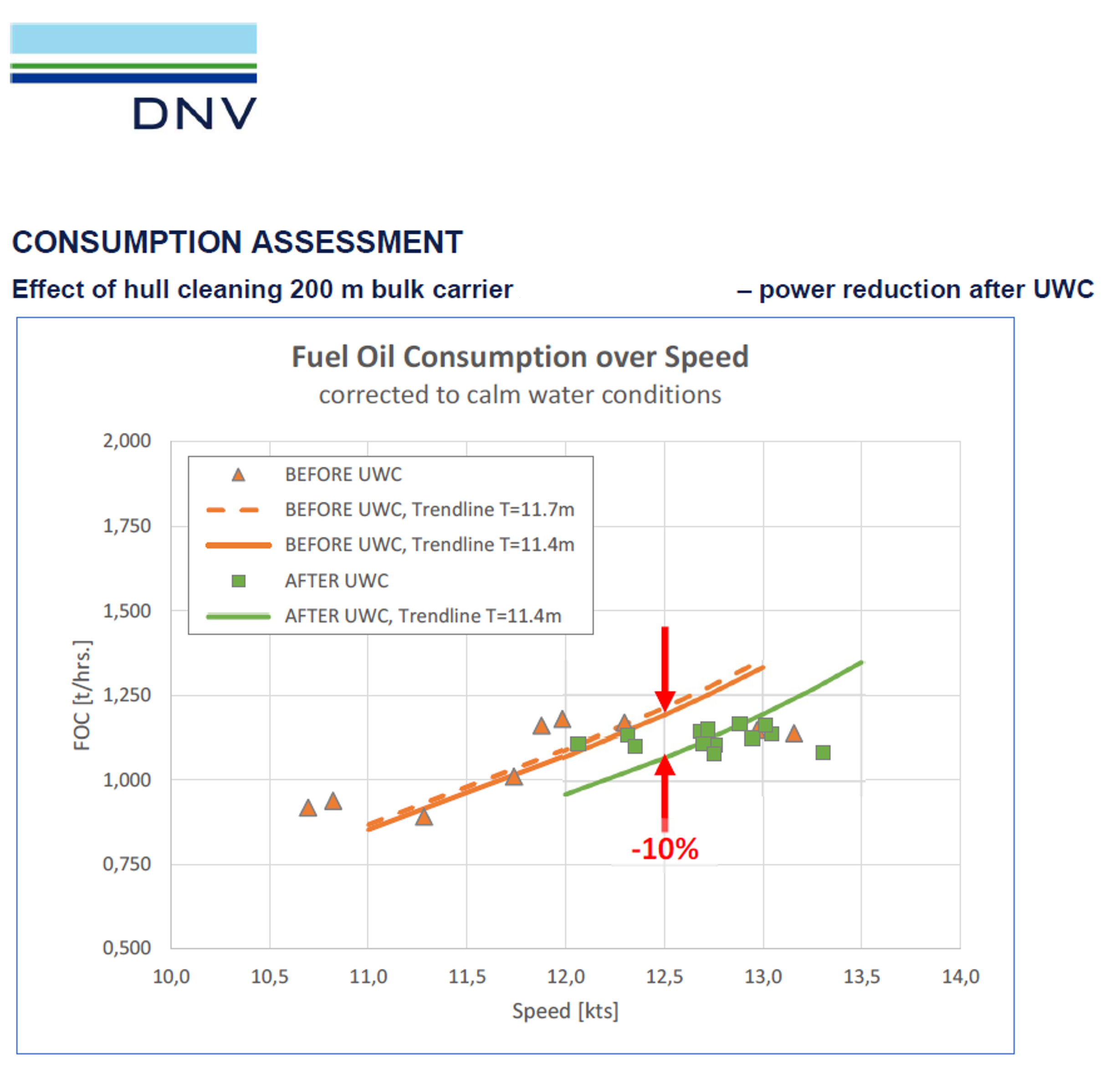Profitable and green: innovative hull maintenance helps Hapag-Lloyd reduce emissions and cut costs
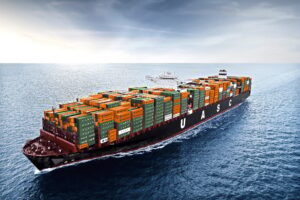
As part of its continued effort to drive sustainability in the maritime industry, German container line Hapag-Lloyd succeeds in reducing both emissions and operational costs through implementing Shipshave’s In Transit Cleaning of Hull (ITCH) solution, with the results documented and confirmed by class society DNV.
In order to independently verify the benefit of proactive fouling removal, Shipshave in cooperation with Hapag-Lloyd commissioned DNV to analyse operational performance data from two Hapag-Lloyd container ships equipped with the ITCH solution. The vessels are of 8,749-TEU and 18,800-TEU, respectively, of different ages and with different trading profiles.
The analysis included data harvested from both vessels over a 17-month period, allowing for an in-depth consideration of 'trend over time' to examine whether Hapag-Lloyd's proactive approach to hull cleaning delivered a representative and consistent result. In its report following the assessment, DNV confirms that both ships achieved a significant fuel saving and reduction in emissions based on improved energy efficiency.
According to the DNV study, the actual reduction in fuel and emissions varied between them due to their different dimensions and operating profile, but both were impressive. One saw a staggering 16% improvement in performance equal to a reduction in fuel consumption of approximately 8.4 tons per day – which equates to removing the emissions of over 4,900 fossil-fuel-driven cars over the same time period. The other vessel showed better initial performance but still achieved a reduction in fuel consumption of just under 5%. The performance was maintained over time by regularly using the ITCH unit.
These key figures clearly demonstrate how Hapag-Lloyd is maintaining its leadership in sustainability and efficiency, managing fouling to reduce drag and lower emissions for long-term benefits.
“We are very pleased that this analysis from DNV confirms our internal assessment of the result achieved by the implementation of ITCH. This method reflects our proactive approach to reducing emissions caused by biofouling,” said Nikhilesh Bhatia, Director Fleet Energy Efficiency, being responsible for the ITCH project at Hapag-Lloyd.
Over the assessment period, the ITCH system successfully managed hull biofouling, by initially reducing resistance. Additional fouling would accumulate over time without repeated hull cleaning. Proactive grooming prevents future degradation of vessel performance due to fouling re-growth. This long-term effect was not accounted for in the analysis and is likely to underestimate the total economic benefit of proactive cleaning with ITCH.
Nevertheless, Return on Investment (ROI) from the ITCH system for the two vessels was under 3 months at sea in these cases.
“The findings of this case study emphasize the critical role of minimizing biofouling in reducing greenhouse gas emissions from shipping. As outlined in our recent Maritime Forecast to 2050 report, regular or proactive hull cleaning remains one of the most effective strategies to achieve this goal," said Dr. Uwe Hollenbach, Senior Principal Consultant at DNV Maritime Advisory, Ship Performance Center, Hamburg.
Hapag-Lloyd’s Nikhilesh Bhatia said: “This is an excellent example of how Hapag-Lloyd promotes sustainable maritime transport, by implementing innovative technology leading to reduced emissions and improved financial performance both in the short and long term.”
In summary, Hapag-Lloyd's commitment to sustainable shipping through innovative green technologies such as ITCH show the company's dedication to responsible shipping practices. With ITCH, prioritising sustainability with a clean hull will lead to a healthier ocean, planet, and strengthen the bottom line.
For more information contact:
Hapag-Lloyd
Nikhilesh Bhatia
Director Fleet Energy Efficiency
Mail: Nikhilesh.Bhatia@hlag.com
Shipshave
Richard Aleksander Tjosvoll
Chief Sales Officer
Shipshave AS
Tel: +47 928 24 498
Mail: richard.tjosvoll@shipshave.no
About Hapag-Lloyd
With a fleet of 292 modern container ships and a total transport capacity of 2.3 million TEU, Hapag-Lloyd is one of the world’s leading liner shipping companies. In the Liner Shipping segment, the Company has around 13,700 employees and 399 offices in 139 countries. Hapag-Lloyd has a container capacity of 3.4 million TEU – including one of the largest and most modern fleets of reefer containers. A total of 113 liner services worldwide ensure fast and reliable connections between more than 600 ports on all the continents. In the Terminal & Infrastructure segment, Hapag-Lloyd has equity stakes in 20 terminals in Europe, Latin America, the United States, India and North Africa. 3,000 employees are assigned to the Terminal & Infrastructure segment and provide complementary logistics services at selected locations in addition to the terminal activities.
About Shipshave
Shipshave is a technology company dedicated to proactive hull performance management solutions for optimised performance, reduced cost and improved sustainability in the shipping industry. It is headquartered in Stavanger, Norway and with offices in Singapore and Athens, Greece.
Established in 2019 it has quicky established itself as a provider of innovative solutions for hull cleaning with over 100 installations across 30 ship owners, many of which are well renowned names in the maritime industry.
Its flagship product, Shipshave ITCH, is a semi-autonomous robot for in transit cleaning of hulls. Enabling crew to clean and owners to take control of their hull performance.
About Shipshave ITCH
Shipshave ITCH is a semi-autonomous robot deployed by the crew. It is easy to operate and can be implemented immediately as it requires no physical installation on the vessel. Deployed regularly to remove fouling from the hull it allows ship owners to better manage vessel performance and energy efficiency. By using the flow of the water across the hull it moves up and down on the hull while gently brushing away fouling during transit.
Discover how Shipshave’s ITCH solution can help reduce emissions, click here

Shipshave scoops coveted tech innovation award for in-transit hull cleaning solution
Shipshave has emerged as the winner of the coveted Most Innovative Proven Technology Award in the inaugural SNIC Innovation Awards for its cutting-edge in-transit cleaning of hulls (ITCH) solution that removes biofouling during a voyage to boost fuel efficiency and decarbonisation.
The keenly contested prize was among three technology awards handed out at the Singapore Norway Innovation Conference (SNIC) 2023, with the theme Innovate to Zero, that is hosted annually in the Lion City by the Norwegian Business Association Singapore (NBAS).
Shipshave earned the accolade for having “the most innovative commercial-ready and implementable solutions or products proven to impact the maritime industry through improving operational efficiency, sustainability or decarbonisation”, according to the award citation.
‘Strong endorsement’
The Stavanger-based company was selected among a strong field of candidates for the award by an expert jury including Innovation Norway’s technology advisor Per Christer Lund and DNV Maritime’s Regional Manager South East Asia, Pacific & India, Cristina Saenz de Santa Maria.
The award was presented to Shipshave’s Regional Sales & Marketing Director - APAC, Charlie Lim, by NBAS President Leonard Stornes, who headed the jury.
“We are extremely honoured and delighted to have secured this award, which represents a strong endorsement of our unique low-cost solution to reduce biofouling en-route, thereby contributing to cleaner hulls with less drag to cut fuel consumption and emissions,” says Shipshave’s CEO Aage Hoejmark.
He continues: “This is a well-deserved recognition of the work done by our team together with our partners and early adopters. Innovation Norway and the Norwegian Research Council also deserves an honourable mention for having contributed to the funding of the ITCH development.”
Shipshave’s ITCH solution is a semi-autonomous hull-cleaning robot that can be deployed by the crew from a portable winch mounted on the forecastle deck.
The robotic tool harvests propulsion energy to stay attached to the hull and swipe up and down the hull underwater using soft brushes. An integrated video camera on the device enables real-time monitoring of the hull cleaning process and post-cleaning inspection via the ITCH digital application.
Implementation by industry
It is estimated the technology can clean between 80-90% of the parallel/vertical area of a Handysize bulker’s hull during sailing in a five-hour operation, with typical opex of less than $250 per cleaning.
Proactive cleaning of the vessel to prevent fouling, which increases viscous resistance and vessel drag in the water, results in better hull performance due to improved hydrodynamics that cuts fuel use. According to the IMO’s GloFouling report, well maintained hulls can contribute to a 5-25% reduction in GHG emissions.
This means vessel speed can be maintained during transit while still meeting CII requirements, thereby avoiding slow steaming that involves costly derating of the engine, according to Hoejmark.
The technology, initially trialled in 2019, is now being implemented in fleet operations by several major industry players following successful testing on a number of vessels.
Stolt Tankers reported a marked reduction in fuel consumption following an initial trial of ITCH on its vessel Stolt Acer during a voyage from Port Said, Egypt to Algeciras, Spain and has expanded trials of the solution to five more ships.
“We utilize ITCH as a mean to reduce additional drag due to fouling, hence reducing emissions to the atmosphere and improving efficiency of the fleet. It also represents a nice example of collaborative effort among Shipshave and Stolt Tankers,” says Stolt Tankers’ Energy and Conservation Manager, Jose Gonzalez Celis.
Klaveness Combination Carriers is expanding roll-out of the robots across its fleet with five additional units after pilots on four vessels showed fuel efficiency improvements of between 2-5%. Furthermore, Teekay Tankers plans to install Shipshave on four more vessels this year after a successful trial.
Fuel savings
A fuel consumption assessment conducted by DNV found that Shipshave’s technology can deliver fuel savings of around 10% when used regularly.
Shipshave is designed as a proactive solution for hull cleaning as an alternative to retroactive cleaning in ports. This avoids the need for offhire deviations to approved ports for cleaning with associated scheduling and logistics, while also saving time on port turnarounds, Hoejmark explains.
There are further environmental benefits as being able to remove and dispose of fouling mid-ocean rather than in port curbs the spread of non-indigenous invasive species to coastal ecosystems. This also prevents deposits of biocide and plastic residues due to erosion of anti-fouling coatings with heavy-duty cleaning in port.
“Our mission is to redefine hull maintenance, enabling the crew to take control over hull performance and thereby improve voyage efficiency,” says Shipshave’s founder Rune Freyer.
Teekay Tankers to install Shipshave on four ships in 2023
The installation plans are being revealed on the back of a successful trial period during sea passages to keep a silicone-coated hull free of fouling which the tanker owner carried out in coordination with Hempel Paint.
The move is part of the company’s energy efficiency strategy aimed at meeting the company’s GHG reduction goals.
The innovative system is developed by the Norwegian company Shipshave. The In-Transit Cleaning of Hulls (ITCH) allows the crew to clean the hull while a ship is sailing, instead of hiring specialists, and dispose of removed fouling far from shores to avoid invasive species disturbing marine life.
The semi-autonomous hull cleaning robot comprises a winch on the foredeck of the vessel that tethers the robot. The robot is equipped with soft brushes, harvests propulsion energy to clean the vertical sides of the hull underwater, and sweeps up and down. It travels with a defined pattern with controlled brush forces.
The system is intended to be proactively applied before fouling becomes a real problem, but it can also remove settled fouling by repetitive operations, according to Shipshave.
The system has been utilized by industry majors such as Stolt Tankers and Klaveness Combination Carriers (KCC).
After a successful pilot of Shipshave’s solution onboard four vessels over 2021-22, KCC has confirmed an order for purchasing a further five latest generation Shipshave ITCH models.
According to the company, the decision was made after analyzing the fuel performance of the four vessels operating a Shipshave ITCH, which showed improvements in fuel efficiency between 2-5%.
- The article was written April 12, 2023, by Jasmina Ovcina Mandra with Offshore Energy.
It's not bragging if you can back it up!
Klaveness Combination Carriers (KCC) will expand its roll-out of the semi-autonomous hull cleaning solution, Shipshave ITCH, with five additional robots to reduce hull fouling on its fleet.
After a successful pilot of Shipshave’s solution onboard four vessels over 2021-22, KCC has confirmed an order for purchasing a further five latest generation Shipshave ITCH models. The decision was made after analyzing the fuel performance of the four vessels operating a Shipshave ITCH, which showed improvements in fuel efficiency between 2-5%. A close collaboration with Klaveness Ship Management (KSM), the crew aboard the vessel and Shipshave’s engineers has been essential for further developing the solution to become a fleet-wide tool for KCC.
“The friction force from the vessels’ hulls is the major resistance factor from the operation of deep-sea vessels. Biofouling of the hull greatly increases this resistance, resulting in higher carbon emissions. In addition, there is also a potential biodiversity risk when transferring alien biomass from the vessels’ hulls across oceans into vulnerable regions. Shipshave ITCH helps us to maintain fouling-free vertical sides of the hulls and delivers on both challenges and we look forward to rolling out the solution to the full CLEANBU fleet,” comments KSM’s Head of Projects and Business Transformation Martin Wattum.
“KCC was the very first pilot user of our ITCH and has played a significant role in our further developments. Simplifications and improvements are the result of top collaboration between the tripartite structure of the User, Supplier and Buyer. We believe innovation is well nurtured this way. Shipshave, and early mover KCC, has worked well together. We are very happy to supply KCC with a solution aiding in their pursuit of very ambitions sustainability goals. The savings obtained using ITCH makes an impressive ROI”, says Eirik Eide, Chief Commercial Officer at Shipshave.
Returning customers = Happy customers
Stolt Tankers has successfully completed an in-transit hull cleaning trial using Shipshave’s ITCH (In-Transit Cleaning of Hulls) on board the Stolt Acer (pictured) as she sailed from Port Said, Egypt to Algeciras, Spain.
Biofouling on ships’ hulls is a major concern for shipping companies as it not only increases fuel consumption, but can also lead to the transfer of invasive species to non-native waters. In transit hull cleaning gently cleans the hull more regularly than manual cleaning by divers. The reduction in the amount of drag due to biofouling consequently decreases fuel consumption.
Energy and Conservation Manager at Stolt Tankers, Jose Gonzalez Celis said: “The results of the initial trial were very positive. We saw a reduction of fuel consumption during the voyage, and this when combined with some of the other technological developments we are investigating will have a significant impact on our overall fuel consumption.”
Until more environmentally friendly fuels are readily available, Stolt Tankers is exploring several technical solutions to support the transition to a low-carbon maritime industry and plans to expand the Shipshave trial to five more ships. Stolt believes that a greener future will require the right combination of new technical solutions, technology and future fuels.
“Traditionally, ship owners tend to have a reactive approach to vessel maintenance, rather than taking preventive measures.” Adds Lucas Vos, President Stolt Tankers. “As part of our continuous improvement mindset we have turned that idea on its head and found that taking a more proactive stance before biofouling has a chance to settle on a ship’s hull is a far more sensible approach.”
“Reducing the marine growth on the underwater hull of our ships by applying Shipshave’s innovative solution is just one of the ways in which we are improving our energy efficiency with the aim of reducing our carbon intensity by 50% (relative to 2008 levels) by 2030.”
Shipshave’s ITCH performs hull cleaning while the vessel is sailing to prevent the early-stage growth of hull biofouling. DNV has performed a consumption assessment calculation and found that Shipshave’s technology can deliver fuel savings of around 10% when used regularly. The crew of the Stolt Acer also reported that the device was easy to use, clean and maintain.
Stolt Tanker’s full release can be accessed here:
https://www.stolt-nielsen.com/news-insights/news/stolt-tankers-trials-innovative-in-transit-hull-cleaning-technology/
Supply chain of shipping
Shipshave tries to stay on top of members of the supply chain in shipping’s different approaches when it comes to pursuit of sustainable operations.
As a supplier to the industry of sea going transportation, we are impressed of the efforts implemented.
Access the full article via this link:
https://www.bp.com/en/global/corporate/news-and-insights/reimagining-energy/decarbonizing-shipping.html
A high value pilot customer has completed the 1st phase of verification of ITCH’s efficiency. Grooming only the starboard side, at the end of the vessel’s docking schedule, a visual and comparative approach was set.
ITCH was operated 3 times prior to dry docking the vessel late December 2021. Comparing port side to starboard clearly shows the removal of the green and white microfouling.
The 2nd phase of the verification will take place once microfouling has established on the fresh coat of paint. Thereafter ITCH will be used on both sides where the fuel economy will be compared to 1-2 sister vessels in identical trade.
16/02/2022
Fuel consumption assessment by DNV
DNV’s objective was to assess if the use of ITCH of the wetted surface of the vertical sides has affected the speed-power of the Bulk Carrier. The evaluation is based on noon report data. AIS data for the vessel is used to extract hindcast data with information about wind, waves and current.
The reduction in fuel oil consumption of -10% due to partial hull cleaning has been derived thereof.
Shipshave is very pleased to be presenting here within the identified savings obtained by the use of our In-Transit Cleaning of Hulls (ITCH). We belive that the ITCH is a means to improve the vessels CII-rating and should be considered when compiling the enhanced SEEMP.
The Owner of the vessel in question has elected to remain unnamed, hence the masking of the vessel ID in the image.


